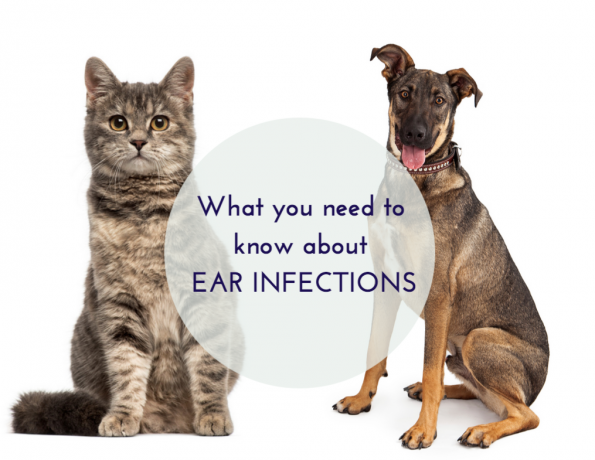Does the smell of your dog’s ears arrive in the room before he does? Does he keep you up at night shaking his head and digging at his ears? Do you clean his ears only to find the next day it is full of discharge again? If so he likely has an ear infection.
If you suspect an ear infection, get it treated early. Ear infections are painful and if not treated properly can lead to a lifetime of ear problems.
Ear infections that are not caught early and treated completely cause chronic pathologic changes to the lining of the ear canal. Long before the dog is shaking his head or producing that smelly discharge, there are small changes happening inside the dog’s ears. First, the cells of the ear canal — an L-shaped tube that runs from the outer ear to the eardrum — become inflamed and swollen, narrowing the canal.
The ear canal is lined with glands that produce wax and keep the canal moist. A small number of normally harmless bacteria and yeast live in that waxy coating, kept in check by the conditions of the healthy ear canal. When a dog’s ear becomes inflamed, that balance is disturbed. The increased heat of an inflamed ear causes the wax glands to become larger and more active, helping create a perfect environment for bacteria and fungus to grow.
If a dog has a single ear infection, diagnosis and treatment with prescription ear medication can put an end to the story. But in dogs with underlying conditions that cause inflammation, most commonly due to allergies, that is just the beginning. Anytime a dog has recurrent ear infections, underlying environmental or food allergies must be considered and brought under control to successfully manage the ears.
Each time the dog’s ears become inflamed, the ear canal becomes scarred and narrower, while the wax glands become larger and more active. This sets up a vicious cycle of inflammation, moisture, itching and infection that is increasingly hard to break. Eventually, bacteria and yeast can spread into the inner ear and even infect the bulla, an empty bony space behind the eardrum. Such infections are painful, can only be treated surgically and can cause deafness.
Swimming can also trigger ear infections, but it’s probably not the water alone that’s responsible. Some of the breeds that love to swim such as Golden and Labrador Retrievers, are also those with allergy problems.
Genetics can also play a role in chronic ear infections, and breeds including the Shar-pei and the Cocker Spaniel have more than their fair share of skin and ear problems.
Whether the cause of your dog’s chronic ear infections is allergies, genetics, swimming or some combination of all three, the cure is the same. Since heat and moisture are the enemies, dry your dog’s ears after swimming or bathing. Your veterinarian may recommend an ear cleaning agent for your dog. Realize that many dogs do not need their ears cleaned regularly and not all cleaning agents are suitable for your dog’s condition, so seek the advice of a veterinarian.
Avoid commercial or homemade cleansers that contain alcohol or hydrogen peroxide. For a homemade recipes you can use two parts water to one part table vinegar. A commercial, convenient option is a medicated wipe, MalAcetic Wet Wipes, which combine acetic acid with boric acid that help to prevent the overgrowth of yeast and bacteria in the ear canal.
Everyday that your dog’s ears are inflamed and infected causes damage to the ear canal that can make future infections more frequent and severe. Seek veterinary care right away and be sure to follow through on the course of treatment. You dog will thank you!

